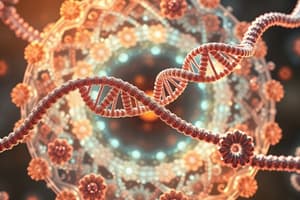Podcast
Questions and Answers
What is the primary focus of Graduate and Postdoctoral Researchers mentioned in the text?
What is the primary focus of Graduate and Postdoctoral Researchers mentioned in the text?
- Developing critical thinking skills
- Working as research assistants in labs
- Analyzing biological data
- Conducting research projects on cellular processes (correct)
What is a valuable experience for undergraduates in Cell Biology according to the text?
What is a valuable experience for undergraduates in Cell Biology according to the text?
- Working as teaching assistants in labs
- Attending theoretical lectures only
- Gaining hands-on experience as research assistants (correct)
- Conducting research projects independently
Why is it essential to keep up with advancements in technology and techniques in cell biology?
Why is it essential to keep up with advancements in technology and techniques in cell biology?
- To better understand the intricate workings of cells (correct)
- To avoid working on research projects
- To make the field more challenging
- To limit career opportunities
What do bioinformaticians primarily do in the field of cell biology?
What do bioinformaticians primarily do in the field of cell biology?
Why does the text suggest that cell biology is a dynamic field of study?
Why does the text suggest that cell biology is a dynamic field of study?
Flashcards are hidden until you start studying
Study Notes
Cell Biology: A Comprehensive Overview
Cell biology, the study of cells and their processes, is a fundamental aspect of biology. Cells, the building blocks of life, operate like miniature factories, performing a myriad of functions that sustain life. In this article, we'll delve into the world of cell biology, exploring its subdisciplines and career opportunities.
The Cellular Landscape
Cells come in various shapes and sizes, with two main types: prokaryotic (e.g., bacteria) and eukaryotic (e.g., plants, animals, and fungi). Eukaryotic cells contain membrane-bound organelles, such as the nucleus, endoplasmic reticulum, and mitochondria, which facilitate diverse cellular processes.
Key Cellular Processes
- DNA Replication: A critical process for cell division, ensuring that each daughter cell receives a complete set of genetic information.
- Protein Synthesis: Ribosomes translate messenger RNA (mRNA) into proteins, which are essential for cellular structure and function.
- Cell Division (Mitosis and Meiosis): Mitosis produces two genetically identical daughter cells, while meiosis produces four genetically diverse cells, essential for sexual reproduction.
- Endocytosis and Exocytosis: Cellular processes that allow cells to take up substances from their environment and dispose of waste products.
Career Paths in Cell Biology
- Biology Research Assistants: Help established researchers perform experiments and maintain laboratories.
- Graduate and Postdoctoral Researchers: Design and conduct research projects, often focusing on specific cellular processes.
- Bioinformaticians: Analyze and interpret biological data using computational methods.
Undergraduates in Cell Biology
Undergraduate research is a valuable experience that can help students develop critical thinking skills and prepare for careers in cell biology. Students may also work as research assistants, gaining hands-on experience in labs and contributing to ongoing projects.
Challenges and Opportunities
- Challenges: Working in a fast-changing field can be challenging, and keeping up with advancements in technology and techniques is essential.
- Opportunities: Cell biology offers diverse career paths, ranging from laboratory work to bioinformatics and data science.
Conclusion
Cell biology is a fascinating field that offers a wealth of opportunities for students and professionals. By understanding the intricate workings of cells, we can better appreciate the complex processes that sustain life. As new technologies and techniques continue to emerge, the field of cell biology will remain a dynamic and rewarding area of study.
Studying That Suits You
Use AI to generate personalized quizzes and flashcards to suit your learning preferences.




